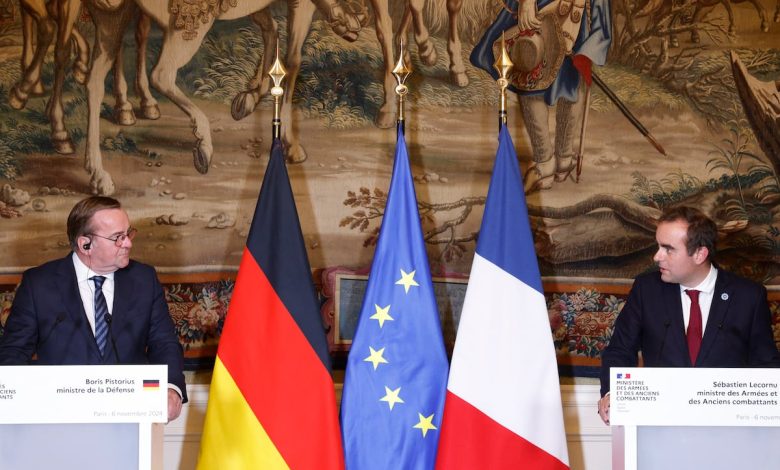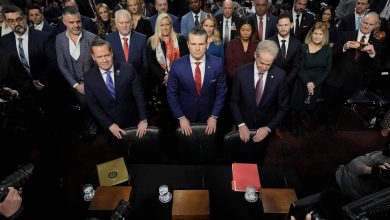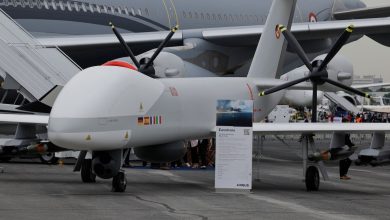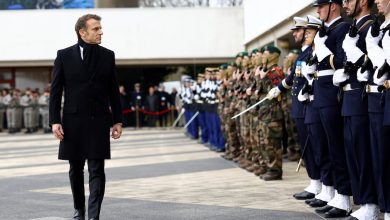French, German defense leaders urge European unity after Trump win

PARIS — France and Germany emphasized the need to keep up military spending and for unity on European security, including with the U.K., following a meeting between the two countries’ defense ministers in response to Donald Trump’s victory in the 2024 U.S. presidential election.
NATO members need to translate defense spending into a tangible contribution in the coming years, with troops, ships and aircraft that show their citizens the alliance is a military organization, not just a political one, French Armed Forces Minister Sébastien Lecornu said in a press briefing with German Defense Minister Boris Pistorius, after they met in Paris on Wednesday.
During his first term, Trump regularly slammed European countries for not spending enough on defense, saying they were taking advantage of U.S. military power. At a campaign rally in February, the former president said he would encourage Russia to “do whatever they hell they want” to NATO members that didn’t meet their financial obligations to the alliance.
“The question of multilateralism is at stake, the question of how we as Europeans position ourselves in this world order,” Pistorius said. “We have to close ranks in order to be able to fully develop our strength. In the future, this will be even more important than in the past.”
Germany and France have a significant contribution to make on defense, as the European Union’s largest economies, but Poland also has a central role to play as NATO’s largest country in Eastern Europe, Pistorius said. The U.K and Italy should also be part of defense cooperation, and the German minister said he and Lecornu will invite their counterparts from Warsaw, London and Rome for a meeting of the five countries in Berlin within the next two weeks.
The U.S. will remain an important partner – “it can’t be any different” – Pistorius said. The EU and the U.S. have shared interests, and geopolitical challenges such as upholding international law, guaranteeing free trade, security of the seas and freedom of movement can only be tackled by the NATO partners sticking together, according to the minister.
The call for unity comes at a tenuous time for both nations. France held snap elections this year that resulted in a parliament without any majority, and a government without a clear mandate that nevertheless has announced billions of spending cuts to reign in a galloping budget deficit.
Lecornu emphasized the need for France to pursue its 2024-2030 defense spending plan regardless of the country’s domestic difficulties.
In the German capital, as Pistorius was speaking in Paris, the governing coalition collapsed, with social-democratic Chancellor Olaf Scholz pushing to oust Finance Minister Christian Lindner of the Free Liberals. Differences had come to a head within the three-party coalition over Lindner’s resistance against emergency spending on everything from energy price caps to Ukraine assistance, Scholz said in statement Wednesday evening.
The incoming U.S. President has been skeptical about continuing to support Ukraine as it fights off a Russian invasion, and European leaders and defense analysts are worried about how to avoid a Ukrainian defeat should Trump decide to cut aid to the embattled nation.
The war waged by Russian President Vladimir Putin in Ukraine makes clear that Europe can’t afford to have any defense capability gaps, according to Pistorius. Ukraine will continue to need the support of European nations, with the military situation “anything but promising at the moment,” the German minister said.
Trump’s anticipated victory creates “considerable uncertainty” for both Ukraine and its international partners, said Matthew Savill, military sciences director at the U.K.’s Royal United Services Institute, in an emailed comment. Europe and NATO should consider whether they can do more for Ukraine, as Trump’s desire for a peace deal “does not bode well for sustained U.S. support.”
NATO will have to focus on keeping the alliance together, rather than on the growing threat of Russia, said Ed Arnold, RUSI’s senior research fellow for European security. If neither NATO or the EU can step up quickly to continue support for Ukraine, “then European coalitions of the willing must step up, requiring bold leadership which has been lacking for several years,” Arnold said.
Europe has to be able to do more to defend itself, as well as protect its defense industries, Lecornu said. He said the first necessity, “and this will come as no surprise, is to continue re-arming.”
Sebastian Sprenger in Cologne, Germany, contributed to this report.
Rudy Ruitenberg is a Europe correspondent for Defense News. He started his career at Bloomberg News and has experience reporting on technology, commodity markets and politics.
Read the full article here






